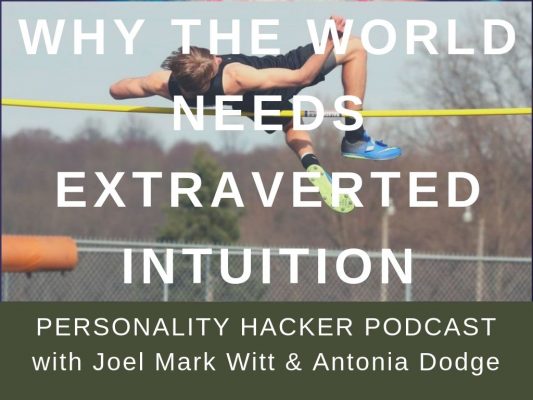Download Episode Here – right click link and select “Save Link As…”
In this episode, Joel and Antonia become advocates for the cognitive function of Extraverted Intuition (“Exploration”) and talk about why we need it in our world.
In this podcast you’ll find:
To subscribe to the podcast, please use the links below:
Subscribe with iTunes
Non-iTunes Link
Soundcloud
Stitcher
Google Play
Spotify
Radio Public
PlayerFM
Listen Notes
If you like the podcast and want to help us out in return, please leave an honest rating and review on iTunes by clicking here. It will help the show and its ranking in iTunes immensely! We would be eternally grateful!
Want to learn more?
Discover Your Personal Genius
We want to hear from you. Leave your comments below…



Share:
Podcast - Episode 0283 - Why The World Needs Extraverted Sensing
Podcast - Episode 0285 - Enneagram Myths Part 1 - The Body Center Types 8 - 9 - 1 (with Beatrice Chestnut)
7 comments
Loved this series and particularly this podcast.
I loved where Antoinia quoted Samuel Beckett. In a similar fashion, I love a quote by Jon Acuff ….“Be brave enough to be bad at something new”. In the past i have used this quote as motivation to step out and try things i wouldnt normally have the courage to try, for fear of failure (life drawing etc). It has been used as a prompt to step into Ne!
This ENFP loved this podcast. I am very very lucky to have my buddies to discuss life with, including a friend who has reawakened me to MB via Ne / Si etc – I don’t know what this build is called? – and others looking at how we develop our shared profession through values, gender, good leadership. One issue is how to move forward while curbing unthinking novelty – people wanting to (literally) build shiny new things (railways, roads, power plants) instead of maintaining what we already have, or without asking what are we building for. So this podcast was really useful. And I need to work on my Si. I have subscribed enthusiastically, and I have to confess it’s the first podcast that’s ever made me want to do that – my iPhone 6 analog? warm wishes, Ruth
I got introduced to MBTI as a preteen, and ever since then, I’d been growing up while seeing the framework of MBTI, and honestly, as an NP, I found I get really frustrated with Ne and all its flaws. So I’d like to share something to all of you, and I don’t mean to do some overly sappy emotional stuff, but I think this might help with both my and possibly whoever is reading this’s development. Though I’m not sure it would make much of a difference, but oh well.
An Open Letter to the Ne Function :
Dear Ne,
Here is a list of things I want to say to you. I’m not going with the usual greetings for a letter. That would be boring. So let’s cut to the chase.
1. You’ve really contributed to my lack of attention span over the years. I can’t ever seem to function with much of a schedule. With you in my brain, I can go throughout a day reading about the most random stuff, but somehow, this lack of attention span has really contributed to my creativity. When other people get stuck in a rut from focusing on trying the same solutions over and over again harder and harder, I get distracted, and somehow while getting distracted, I find some inspiration in some unrelated subject to help with my daily problems. So thank you for that.
2. You’re a rather energetic type of person, aren’t you, Ne? I find your constant desperation for some kind of novelty has really allowed me to take a lot of risks and learn a lot of new things in life. Growing up, I find that I’ve been nagged about things that have the smallest risks, and I seem to have this constant pressure that risky things shouldn’t be done at all. I made music when bored in a class, using pencils as drum sticks, and somehow other students are immediately convinced that the pencils would somehow go all the way across the table to somehow poke my eye. That’s not how physics works. I don’t have as much of a fear of risk because of you, and I find that this has benefited me greatly in life.
3. I find, that listening to your advice, Ne, has really allowed me to stand out in social situations. Growing up, people make the mistake in believing that people like you more because you’re the same, but what happens is that in being the same, people become more easily bored around you. I didn’t realize on a deeper level how hard creativity is for some people. I thought people were somewhat like me. Creative, but unwilling to show it. Now I realize people really don’t have new ideas of what to say and try in their head, and that’s why they’re always repeating the same things.
4. I can’t ever stop personal growth because of you, Ne. Other people often go at the point where, “I’ve learned enough, and I’m mature enough. Now let me live a peaceful routine life,” but I’m not like that. I always want to grow, and to learn more. I hate how easily bored you make me sometimes, but boredom can be a positive emotion, in that rather than calling you to get attached to unhealthy exciting addictions, boredom can push you to try something novel on a meaningful level. I find, deep within me, you’ve given me a sense of existential boredom, and I need to explore new ways of thinking that shatter my belief systems to change everything. If I have not learned something lifechanging every year, that year was a failure. You, in many ways, often get a reputation of being “childlike,” and so “immature,” when really having the wonder of a child is a type of wisdom in itself.
5. I find I can be spontaneous because of you. Growing up, I took this for granted, but other people can’t seem to be as spontaneous because of this. I don’t mind things having an unexpected turn because often I can quickly thing of something to try out. Unexpected emergency? I can think of something. Unexpected social argument? Let me improvise a speech on the spot to convince them. I’m not without creativity blocks, but I find I have much less than most others. Other people always seem to plan too far ahead in the future, when really, I realize, you’re the type that has the wisdom to view that we can’t always plan everything. Life is full of surprises. If anything, my way of dealing with future fears is not in emphasizing specific plans, but in strengthening my ability to improvise. Other people see “not planning” this way, “irresponsible” or “immature,” and yes I do recognize that a general outline of planning is needed, but to fill in too many details is a type of immaturity in itself in believing that everything will go to plan, or your own likes and dislikes will stay the same. Many other types, in fact, lack the maturity to accept the world is always changing, and you will always have to evolve or adapt to change with it.
Sincerely,
A Friend.
ENTJ here and I relate to SOOOOOO much said on this podcast. The bit about being judged about a misstep 40 years ago to assassinate their character is so dead on. Learning through mistakes is my mantra. Giving space to learn or else “we have a homogenized, milk-toast population” LOLOLOLOLOL. Why are you so in my head?
That was a pretty good podcast and overall a good end to an excellent series I enjoyed immensely. As an INTP I do relate to many things that were said in the podcast.
However, I don’t think I have much of an issue with distraction and saying no to things. That is probably a result of having it as a copilot instead of a driver; my Ti leads my Ne around to things I am currently interested in learning about. I do like the openness and open-endedness that Ne brings, it really encourages curiosity to dig deeper into a subject and learn more. I also agree that mature Ne becomes great at navigating novelty and is a productive force, especially when it is guided by an introverted judging function and tampered with a healthy respect and understanding of Si. As the podcast mentioned, I do think that the issue of novelty consumption is Ne manifested in an unhealthy way. It is mindless consumption without any processing. Additionally, it reminds me of the other extraverted perceiving function, Se – the unhealthy version of it. The internet seems to be a combination of unhealthy manifestations of both functions, which results in a lack of responsibility and consideration of consequences.
One feedback I have about this podcast is that, it was very Ne-random. It seemed to be going off on tangents a lot. I appreciated the intuitive links and the literal example and demonstration of how the process works in the podcast, but I think my Ti was screaming about the lack of focused points. This podcast seemed a lot less focused comparatively, something which I appreciated as an intuitive myself – it gave me many links and things to think about. I would, however, appreciate a more focused podcast. (I think this sentiment might be shared by other listeners)
Overall, thank you for this wonderful series! I really learnt a lot this time.